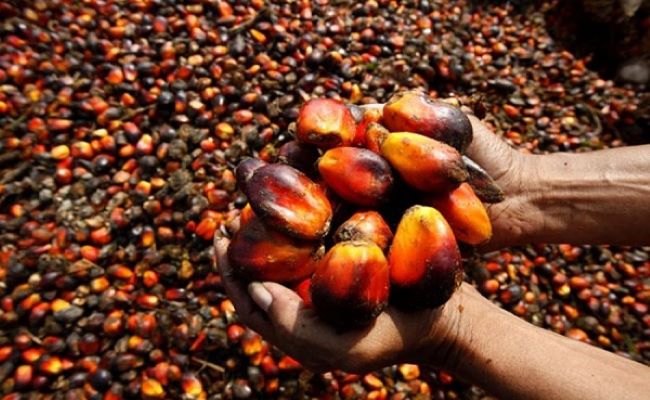 The National Palm Produce Association of Nigeria (NPPAN), says Nigeria spends 600 million dollars on palm oil importation annually.
The National Palm Produce Association of Nigeria (NPPAN), says Nigeria spends 600 million dollars on palm oil importation annually.
Mr Alphonsus Inyang, National President of the association stated this in an interview with the News Agency of Nigeria (NAN) on Tuesday in Abuja.
He described the expenses on palm oil importation as unhealthy for national development.
Inyang said the samount could be saved and injected into the economy if the palm oil sub-sector was given due attention by successive governments.
Don’t involve foreigners in primary oil palm production – Association urges Govt
The president said that Nigeria which was self sufficient in palm oil production in time past, now spends huge amount to import same product.
Inyang said in the 60s, Nigeria was number one in palm oil production and exportation globally, controlling over 60 per cent of world palm oil.
He said that the reverse was the case at the moment as over 50 per cent of what “we consume are imported,”he said.
Inyang said at the moment the country occupies fifth position in the league of palm oil producing countries after Indonesia, Malaysia,Thailand and Colombia.
According to him, Nigeria may even lose the position to smaller countries who are investing heavily in the sector even as Nigeria continues to waste resources on palm oil importation from the same countries
He said Indonesia occupies the first position, producing 50 million metric tons, Malaysia second with 19 million metric tons, Thailand 3.28 million and Colombia 1.9 million metric tons.
The president attributed the challenge to the negelect of the sector by successive governments.
Inyang said based on the U.S. Department of Agriculture, Nigeria currently occupy fifth position in the league of palm oil producing countries with 1.5 per cent or 1.4 million metric tons of the world’s total output.
“Nigeria was overthrown as the world’s largest palm oil producer and exporter by Malaysia and Indonesia in 1966.
“Currently Nigeria is the largest consumer of the product in the continent, consuming approximately three million metric tons yearly.
“Domestic production stands at less than 1.4 million metric tons, leaving a deficit of over 1.6 million metric tones,’’ he said.
Inyang urged government, specifically the Federal Ministry of Agriculture and Food Security to support NPPAN members with seedlings to develop 250,000 hectares per year and halt palm oil importation urgently.
“Our members can plant up to 250,000 hectares per year through the association’s National Oil Palm Strategy Development Plan , all we want are inputs.
“Government does not need to give and develop land for us, we need seedlings, fertilisers, logistics and implements to close this gab within four years.
“We will also create new millionaires in 28 states of the federation, “he said.
How did a net producer of palm oil suddenly become an importer?
Governments in the past were enemies of developing low business holders. Rather, they focused on other sectors that they feel were more organised by way of having access to collateral to pick up single digit interest rates on long- term loans and all that, but the critical mass that create employment and generate revenue for the government in terms of taxation and Gross Domestic Product (GDP) were neglected even as palm oil importation continued to rise.
In the 1960s, we were known for cocoa, oil palm and rubber. The Chinese and foreign investors were able to come in because of the raw materials that were available in large quantity. Countries like Thailand, Indonesia and Malaysia use their crude oil resources to develop their palm oil sector, which generate economic, widespread employment opportunities and all that. They have policies that they put in place to safeguard local production. Again, there is the need to check importation of this product. Look at how much the country has lost in terms of palm oil importation. People are importing polished palm oil and vegetable oil in the name of crude palm oil into the country. Do they pay duties for all these bad items?






















